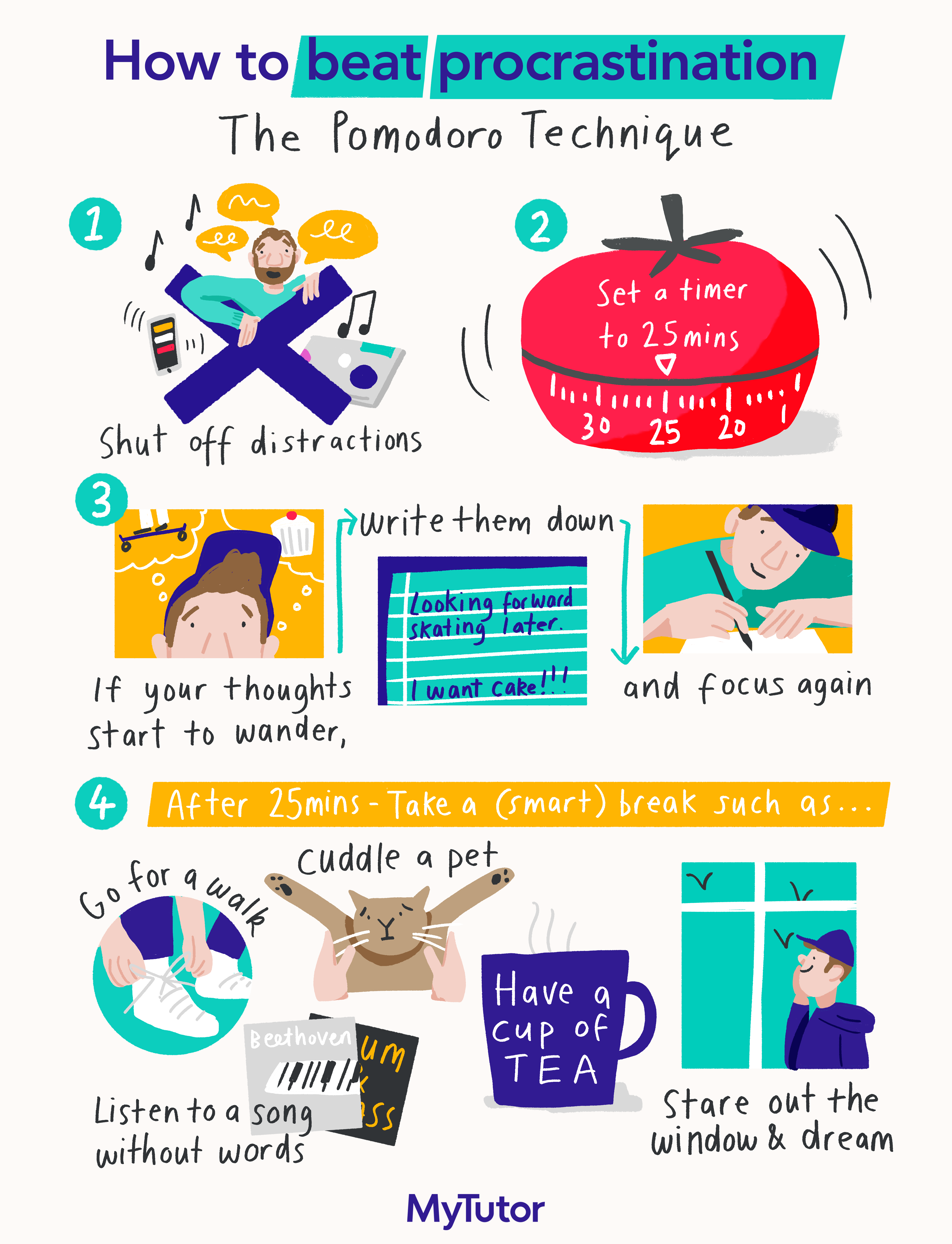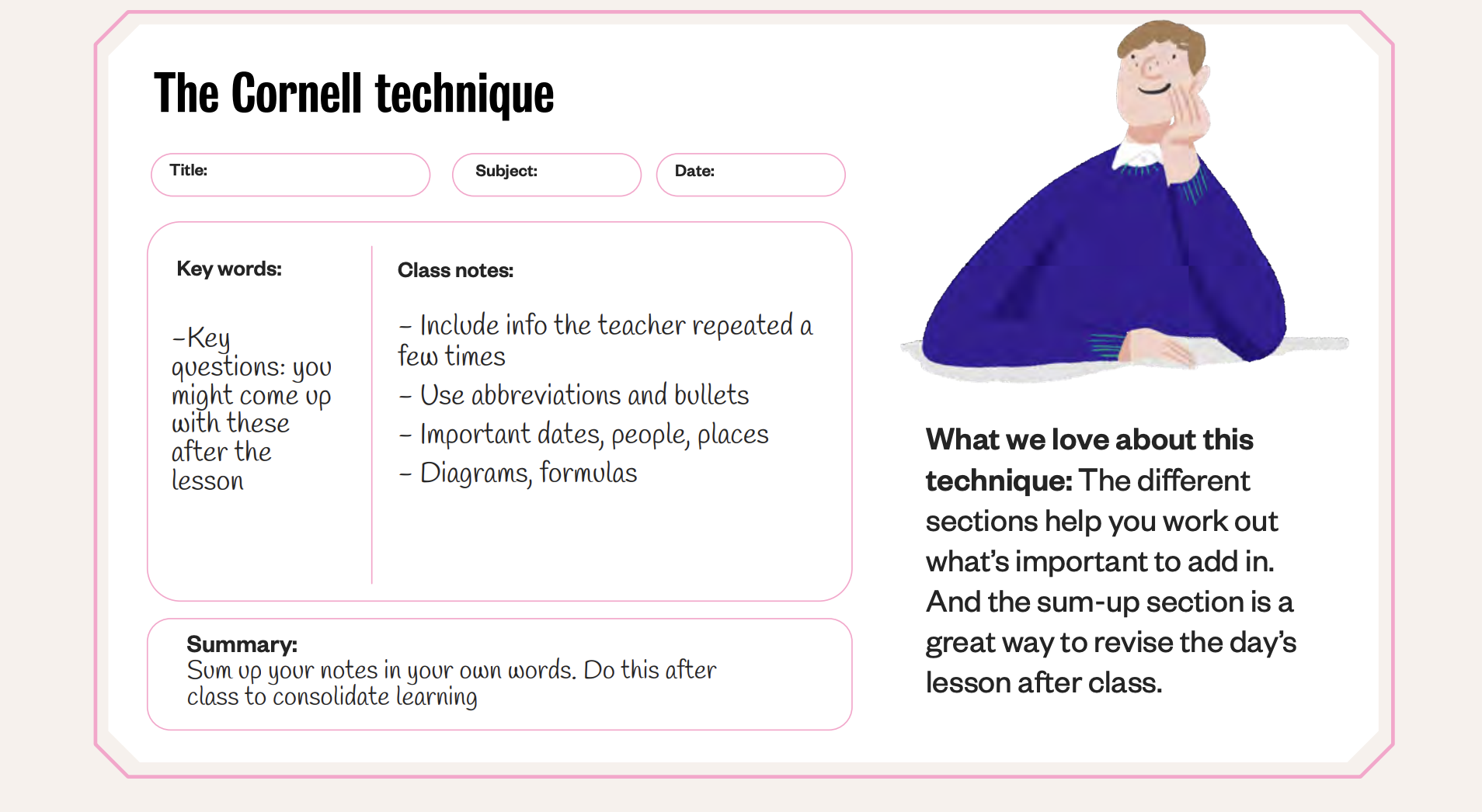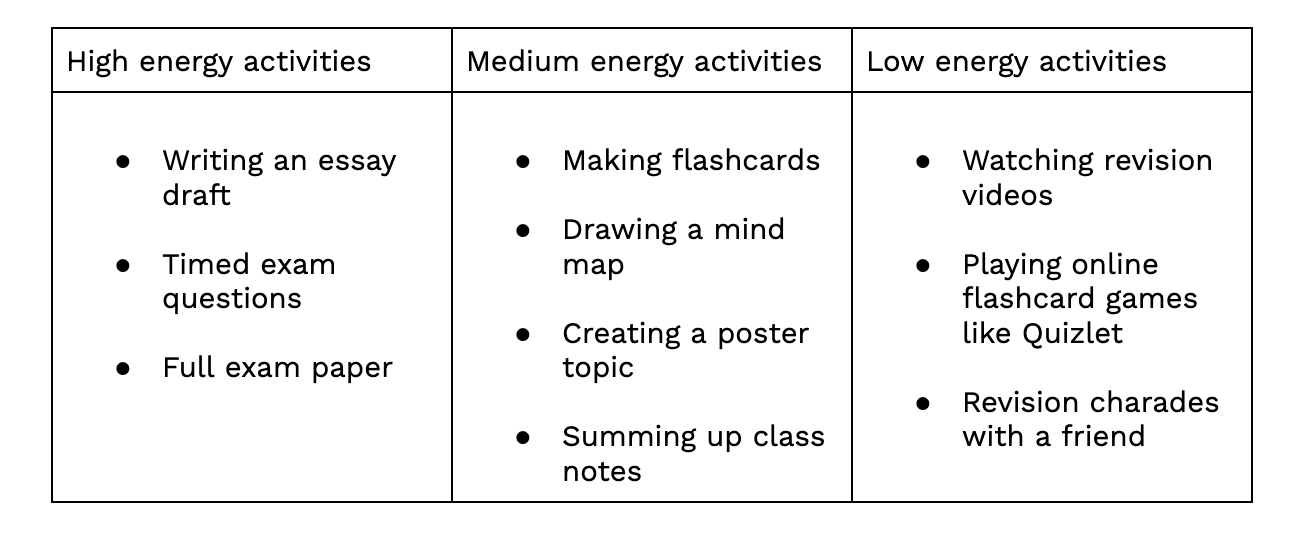Mock exams are just around the corner. If you’re feeling stressed about them, you’re not alone. Most teens we polled in a webinar survey said they weren’t sure what to revise and how to get started.
To help kickstart your revision, our expert exam tutor Matt is here to give you some top tips. Below, you can read his helpful advice on how to ace revision so that you feel confident and ready, going into exams.
To help kickstart your revision, our expert exam tutor Matt is here to give you some top tips. Below, you can read his helpful advice on how to ace revision so that you feel confident and ready, going into exams.
- Start early.
- Make a revision timetable.
- Use the Pomodoro technique to manage your time.
- Mix up high, medium and low revision energy activities
- Reach out for help.
- Tap into some helpful resources
- On exam day, be kind to yourself
1. Start early.
The earlier you start, the more in control you’ll feel in the lead-up to mocks. When you’re cramming, the mountain of work from months of lessons can make you feel overwhelmed and stressed. But when you’re anxious, your brain doesn’t focus, process or recall info as well as it normally would. So that you don’t get into a panic, and really give yourself the best chance possible, start revising early. If you haven’t started yet– don’t worry. Just start now.


2. Make a mocks revision timetable.
The first thing Matt recommends is to make a revision timetable. Break up the week into chunks of study time for different subjects. It’s a good idea to give more time to subjects you find the hardest. Or if you know there’s a big project coming up, set extra time aside for that course.
A good way to keep the day’s lessons fresh in your mind is to look over notes and homework when you get in from school. If you make a habit of it, you’ll feel more in touch with what’s going on in class–which can give a huge boost to your self-confidence.


3. Use the Pomodoro technique to manage your time.
You know you need to start revising–but how do you actually do it? Do you study for hours on end for just one subject, or cover a few subjects on a Saturday afternoon? What’s the best way? Matt recommends using the Pomodoro Technique. With Pomodoro, it’s all about breaking up study time into manageable chunks and giving yourself short breaks in between. Here’s how it works:
- Choose a subject to revise in. For example, GCSE English.
- Set the Pomodoro timer (or pomodoro APP) for 25 minutes.
- Revise the subject by choosing one study activity. For example, you can highlight key words in your notes and homework, or read texts from the English course list, or work with flashcards, or create a mind-map, or plan out how you’d answer an exam question from a past paper…
- End your work when the timer rings and take a short break (about 5 mins). Stretch, move, get a drink of water, have a snack.
- Repeat steps 2-4 for your second Pomodoro round. Matt recommends you set aside at least an hour (so 2 Pomodoros) and to stick to the same subject in that time. By revising the same subject you can go deeper into the course specifications.
Tip: Do a different study activity in each Pomodoro round. So if you read 2 poems for your first Pomodoro round, for the second, create mind maps about the themes, characters and settings of those poems.
It’s important to take breaks when you study. Your brain can only focus for 90 minutes (max) at a time. Even when you’re taking a break, your brain is still working out problems (which is handy!) and those questions which might’ve had you stumped before, can feel more doable when you get back to them.
4. Mix up high, medium and low revision energy activities.
Studying the same way every time can feel boring and it’s actually not the best use of your time. People learn in different ways–and mixing up how you study means you’re giving yourself more chances to go deeper into learning a subject.
Matt suggests having a mix of high, medium and low energy activities. If you’re tired after a long day at school, it makes sense to choose an activity from the low energy list. You’re still learning, but it doesn’t feel like a slog. You can put together a menu of high, medium and low energy activities and pin it to a cork-board next to your desk to take some of the guesswork out.


Here are a few of Matt’s suggestions:
- High energy activities: timed exam questions, full exam papers
- Medium energy activities: Making flashcards, drawing mind-maps, creating a topic poster, highlighting key words in notes
- Low energy activities: watching revision videos, playing online flashcard games (like on Quizlet), revision charades with a friend


5. Reach out for help.
There are times when you’re just feeling lost and don’t know the answers. It’s a completely normal part of learning– getting stuck. There are lots of different ways to work through a problem. You can ask your teacher after class for help, or see them in their office hours. If you don’t feel comfortable doing that, there are homework clubs where subject teachers are there specifically to answer your questions. Other teens in the room will be in the same boat so you’ll know you’re not alone. This autumn term, our expert tutors are giving free group tutorials, so you can ask our MyTutor Squads your burning study questions.
If you’re looking for 1-1 attention, with someone who’s closer in age and gets what it’s like to go through exams, you can get a tutor. Our tutors are students at top UK unis, and experts in GCSE and A level exam prep. Because they were in school just a few years ago, they’re really good with study hacks and know their subjects well.
6. Tap into some helpful resources.
If you’re stuck and need help ASAP, there are a lot of helpful step-by-step explainer videos online. These can help you solve tricky problems in all your GCSE subjects– like our explainer videos on our Tik-Tok account or on our Youtube channel. And on our MyTutor study notes page, you can search through over 10,000 study notes. There you’ll find the trickiest GCSE and A-level topics answered by our curriculum expert tutors.
If you’re looking for study hacks, there are loads of resources (like mind maps, goal setting templates that you can download) over on our Instagram account.
7. On mock exam day, be kind to yourself.
You’ve done all you can to prepare for your mocks. There’s nothing more to do now but to give yourself a break. On exam day, focus on making yourself feel relaxed and comfortable. Eat a healthy breakfast, and wear comfortable clothes. Matt recommends bringing a bottle of water into the exam hall to stay hydrated. Taking sips is a way to take mini breaks as you move through exam questions. If you begin to feel anxious at any point, use the box breathing technique. Breathe in for 5 seconds, hold for 5, and breathe out for 5. This easy breathing exercise helps get more oxygen into your brain, and it also helps you focus on your breath instead of on exam stress.
Take spare pens (black to fit exam rules)– you can never have too many pens. Take time to plan out your answers, in the same way you practiced in revision. If you run into a question that’s tricky or that you don’t know the answer to straight away, Matt recommends skipping it and answering the ones you do know. Answering a few questions can help give you the confidence to go back and tackle the trickier questions you skipped.
When the exam is over, your friends might want to chat about how it went. If you don’t feel like reliving it, make an excuse to leave the conversation. You can go to the library or just take a breather outside where there’s fresh air. You deserve a break.
Exams (even when they’re just mocks) can take up a huge chunk of your time and headspace. Starting early by putting together a revision schedule and mixing up study activities are just some of the ways you can get yourself ready. When you’re prepared, you’ll feel more confident going in. Whatever happens, be proud of yourself for all the hours you’ve put into revision and for giving it your best go.
To sign up for free study skills tutorials with Nketia this autumn term, click here.




